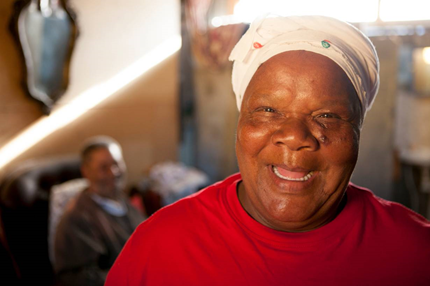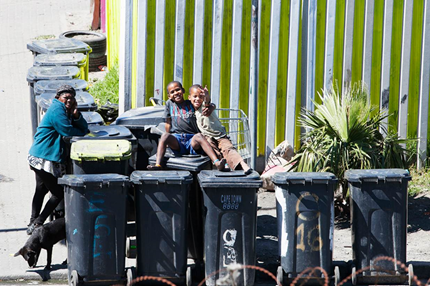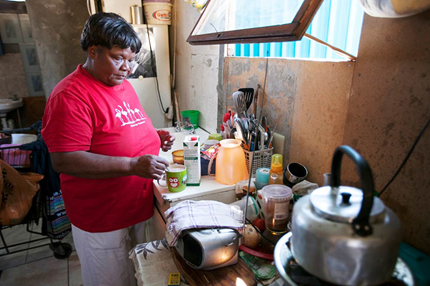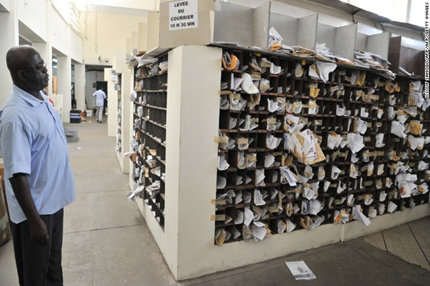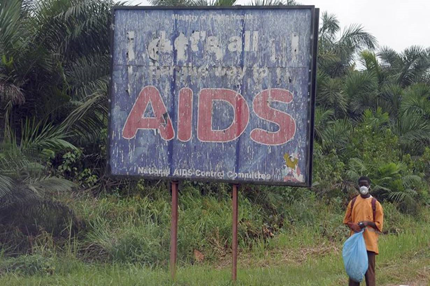In Cape Town, the slums of
Flamingo Crescent and Santini are just 20 kms apart but the gap in
the standard of living in these two settlements is being hailed as
an example of how residents can actively upgrade their own
lives.
Shanty towns are a familiar
sight across the picturesque coastal city, with a third of Cape
Town's 3.7 million residents living in slums or informal
settlements with limited access to basic services, such as water,
electricity and toilets.
Urbanisation is increasing with
villagers flooding daily to South Africa's second biggest city to
find jobs and better lives, increasing pressure for housing and
expanding slums.
Aware that city officials were
facing a 25-year backlog to house people, one Flamingo Crescent
resident took the initiative and, working with the authorities, has
managed to transform her settlement into the envy of many slum
dwellers in the city.
Maria Matthews, known to all as
Auntie Marie, is a 66-year-old firebrand who has driven a community
project to bring water, electricity and toilets to every shack,
changing the lives of the 400 or so Flamingo Crescent
residents.
About 900 million people now
live in slum conditions globally with limited access to basic
services but campaigners hope this small community, with its vital
community lead, could set a precedent and give others a glimmer of
hope.
"When I first came here (11
years ago), there was nothing, it was an open field," community
leader Matthews told the Thomson Reuters Foundation in her cosy,
ensuite home in Flamingo Crescent that she shares with her partner
Patrick Edward du Plessis.
"Law enforcement brought people
here to stay until they could find suitable accommodation
elsewhere. That was for three months, but the three months became
nine years. We had to dig holes to go to the toilet. It was like a
pigsty."
Matthews, together with other
residents, decided things needed to change.
She discovered the Informal
Settlement Network (ISN), a community based movement that engages
government to improve the lives of the urban poor by addressing
security of tenure and better services, and worked with them on
Flamingo Crescent.
This innovative partnership
between Flamingo Crescent residents, Cape Town city, and
non-government organisations has brought taps, toilets and
electricity to every shack.
ORDERED STREETS
It involved a process called
're-blocking' where shacks were demolished, the settlement layout
re-designed and infrastructure brought in to allow for basic
services of water, sanitation and electricity. Shacks were then
re-built.
The shacks of Flamingo Crescent
are now vibrantly coloured, the streets have names, wheelie bins
are neatly lined up outside the front gates, and mail is delivered
to all residents.
The project took three years
from inception to completion, but regional co-ordinator for Cape
Town City Council, Levona Powell, said it showed it could be done
if all parties worked together.
"It's the ultimate goal of the
city to give every single resident a house, but whether we reach
that goal in my lifetime, I'm not sure. There are people who have
been on the housing list for 40 years," she admitted.
Across town in Santini, a
settlement housing about 200 people, the situation is a total
contrast.
It is a maze of tightly packed,
dilapidated shacks strewn with rubbish with no garbage collection,
no drainage and only one tap for all residents.
Officials are aware that a lack
of basic services in informal settlements poses many challenges.
Crime is rife and health risks severe, but so far disputes amongst
residents have stopped any progress in upgrading
Santini.
"There are only 7 toilets for
150 people," Grace Lebakeng, a young mother from Santini told the
Thomson Reuters Foundation.
"We can't go out at night
because there are many criminals. So we have a bucket to go to the
toilet at night. And our children are always ill. They play by the
toilets. There are no open spaces."
FATAL FIRES
With no electricity, residents
rely on candles and fires for light, leading to frequent
fires.
On New Year's Day in 2013 the
worst slum fire in recent history left over 4,000 people homeless
and at least five people dead in Cape Town's largest settlement,
Khayelitsha, that is home about 400,000 people.
Powell from Cape Town City
Council said authorities were struggling to cope with these
sprawling settlements and explained that people living in these
conditions were insecure about tomorrow.
"The gap between the rich and
the poor is huge, coupled with the global phenomenon of
urbanisation, the challenges are clear," she explained in her
office in Cape Town.
"Urbanisation needs innovative
ideas, we embrace that, we can't run away."
ISN's national leader Nkokheli
Ncambele said it was a massive problem as the conditions people
were living were unacceptable.
"Once a settlement exists, the
government must provide basic services, but the city can't win the
battle as settlements grow by night," he told the Thomson Reuters
Foundation.
The upgrading of Flamingo
Crescent seemed insurmountable at first to many.
For while the city committed
resources to providing infrastructure and services, the residents
were asked to commit to paying 20 percent of the cost of the
individual structures.
That was a big call for Flamingo
Crescent where 90 percent of residents are unemployed but Matthews
convinced people.
"You can't take a bread and not
pay for it, because that's stealing," she said as she explained how
she won over residents in time. "We have to
contribute."
Currently 22 pilot projects are
underway in Cape Town but communities must agree before upgrading
can happen.
In Santini upgrading was due to
have started this year, but local politics spurred fear in the
community. The process has come to a standstill, to the dismay of
many residents.
"We want the re-blocking but
some people fear they will lose their houses and then have
nothing," Lebakeng said.
For Matthews the years of work
were worth it.
Thomson Reuters
Foundation
